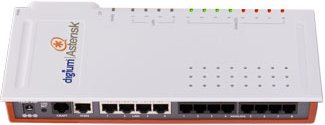Compact, customizable Linux gadget targets IP telephony
Oct 25, 2007 — by Eric Brown — from the LinuxDevices Archive — 8 views Pika Technologies has introduced a compact, customizable, Linux-based IP-PBX appliance. Based on the company's host media processing software, “Pika Warp, the Appliance for Linux,” is said to provide IP-PBX (IP-based private branch exchange) functionality along with integrated voice response (IVR), predictive dialing, and… appointment reminders.
Pika Technologies has introduced a compact, customizable, Linux-based IP-PBX appliance. Based on the company's host media processing software, “Pika Warp, the Appliance for Linux,” is said to provide IP-PBX (IP-based private branch exchange) functionality along with integrated voice response (IVR), predictive dialing, and… appointment reminders.
(Click here for a larger view of the Pika Appliance for Linux)
The Appliance for Linux is the second member of Pika's Warp family, following last month's release of Appliance for Asterisk, which was more specifically aimed at the Asterisk open-source communications platform. Based on Denx's Embedded Linux Development Kit (ELDK), Appliance for Linux also includes Asterisk 1.4.
The off-the-shelf Appliance for Linux is aimed at business customers looking for a low-cost alternative to computer telephony PCs and plug-in board network connectivity. Supporting both VoIP and analog trunks and telephones, the device handles up to 100 IP trunks and phones, and offers an analog telephony port for portable phones, fax devices, and answering machines, with the ability to expand up to eight ports, Pika said. Advanced features include music on hold, power failure transfer and paging.
Terry Atwood, VP of sales and marketing, stated, “By taking the features of a standard off-the-shelf computer, adding some basic telephony features, and packaging them into a small, low-cost, very reliable embedded appliance with an open-source architecture, application developers can more effectively deliver their Linux-based solutions to small- and medium-sized business customers.”
Touted features and specs of the Appliance for Linux include:
- Processor — AMCC Power PC 440EP, clocked at 533MHz (upgradeable to 666MHz)
- Memory — 256MB RAM; 64MB flash (on SD card)
- Display — 2 x 20 backlit LCD display, with API-controlled front-panel scroll button
- Ethernet and USB ports (number and type unspecified)
- Music-on-hold audio in; paging system audio out
- IP and analog telephony I/O:
- up to 100 IP trunk/station interfaces
- one standard FXS (foreign exchange subscriber) interface
- up to eight additional FXO/FXS (foreign exchange office/subscriber) interfaces
- Power failure transfer RJ11 jack(s)
- Dynamic thermal management
- Operating system — Denx ELDK, with a 2.6.19.2 Linux kernel
The Appliance ships with version 2.2 of Pika's host media processing (HMP) software, enabling non-Asterisk Linux application developers to create their own telecom applications, such as IVR, voicemail, custom PBX systems, and gateways, according to the company. Both the Asterisk and generic Linux versions of Pika Warp ship with cross-compile development environments.
“The Warp HMP toolset is unique in that it is not just an Asterisk appliance,” explained David Clarke, Pika's business development manager. “It is also a generic telephony platform for embedded Linux developers, providing them with all the basic media processing building blocks and onboard FXO/FXS interfaces in a single solution.”
The HMP includes Pika's MonteCarlo SDK (software development kit), offering a choice between low- (HMP) and high-level (GrandPrix) C-based APIs. “The HMP API provides ultimate flexibility of media resources and their usage,” claimed Clarke. “The high-level GrandPrix API abstracts the lower resources into channels, making development quicker and easier, but at the same time limiting some of the flexibility.”
 Digium's Asterisk Appliance (Click for details) |
Competitors in the open-source IP/PBX telephony market include 4S Newcom's Mac-based Blue4S and Digium's Asterisk Appliance (shown at right). Digium was founded by Asterisk originator Mark Spencer.
Availability
Pika's Appliance for Linux is sampling now and is expected to reach full production status in February. Depending on configuration and volume, the device will be priced between $600 and $1,500, which includes software licensing, the company said.
The product will be demonstrated at next week's Digium Asterisk World show, held in conjunction with the Fall VON show in Boston.
This article was originally published on LinuxDevices.com and has been donated to the open source community by QuinStreet Inc. Please visit LinuxToday.com for up-to-date news and articles about Linux and open source.